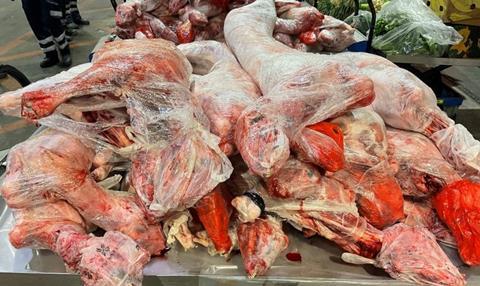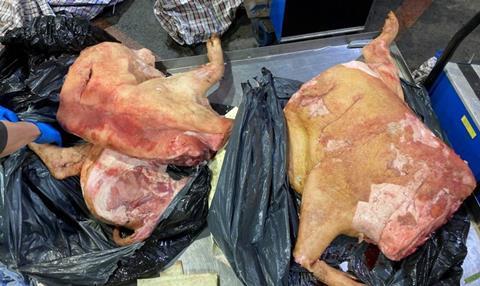Over 3.4 tonnes of illegal meat was seized at the border in Dover over the weekend, just days before the implementation of the latest phase of the Border Target Operating Model (BTOM).

The seizures came from a number of vehicle inspections completed by Dover Port Health Authority (DPHA) at Dover Port between 26-27th April.
The seizures, which are the largest this year so far, included 54 unmarked sheep carcasses from two vehicles from Romania. According to port authorities, the carcasses had travelled for several days in unhygienic conditions and unsuitable packaging such as incomplete domestic clingfilm, black sacks and duct tape.
The meat had also been transported without temperature controls, cross contaminating other food including pig parts, chicken, beef, and cheese items with dripping blood. To stop the potential spread of disease, the illegal meat was removed from the food supply chain by DPHA at the point of entry at Dover.
The seizures are in the wake of increased concerns that African Swine Fever (ASF), which was recently found in Sweden, Italy and Germany could possibly spread to the UK unless crucial border funding and services are maintained, threatening the UK’s pig herd.
Lucy Manzano, head of port health and public protection for DPHA, said: “These seizures demonstrate just how vital the work is of the Dover Port Health Authority when it comes to protecting British supply chains and biosecurity. Despite our limited resources, our inspection teams are fully committed to fighting off the threat of African Swine Fever and other lethal diseases that threaten livestock - seizing over 85 tonnes of illegal meat since the checks were brought in from September 2022.”
The record seizures follow concerns that recent proposals from the Department for Environment, Food and Rural Affairs (Defra) to cut Dover District Council's funding for ASF checks by nearly 70% and move commercial food checks for Dover and the Channel Tunnel to Sevington will create an even bigger risk to British biosecurity.

Manzano added: "Our position remains unchanged on Sevington and the catastrophic funding cuts to the African Swine Fever checks at Dover. At this crucial time, it is vital that Defra and the Government consider the serious risks to British biosecurity that the single-site at Sevington creates.
"In practice this means that commercial imports of animal products, including high-risk meat and meat products will be able to arrive at Dover from Rest-of-World countries, and leave the point-of-entry and Port Health Authority at Dover, to enter our food chain without checks. This is the only border where food that is required to be checked will be able to travel freely and uncontrolled, to self-present at a facility 22 miles away.
“This is an entirely needless risk, when the Government has built a Border Control Post (BCP) in Dover (Bastion) but have decided not to open it, despite it being complete and run to temperature. We are again calling for Defra to open the purpose built BCP at Dover, Bastion Point, and to provide adequate funding for ASF checks so UK farmers, supply chains and biosecurity are protected.”
Meat industry calls for "urgent Government action"
A spokesperson for the Association of Independent Meat Suppliers (AIMS) said: "Like the Dover Port Health Authority we are also very concerned that border control checks are taking place 22 miles away from where vehicles enter the UK. We have suggested to Defra that ANPR cameras be used to track vehicles from Dover to Sevington, however it appears that no progress on this has been made.
"What we have seen over the weekend was illegal meat imports that in no way could be considered to be for personal use. We have suggested that rather than seize this illegal meat the National Food Crimes Unit should be following it through its informal and unregulated supply chain in order to identify who has a demand for this meat, and to then step in and seize the product and charge all those involved in its distribution here in the UK.
"At a recent Defra meeting, we suggested that the UK Government, at the very least, highlight the rules on importing meat and meat products from outside of the EU on the country-specific travel advice pages. However we were told that this was a matter for the Foreign and Commonwealth Office (FCO) and as such we doubt that this will happen anytime soon."
The National Pig Association (NPA) said: "The latest seizure of illegal meat imports at Dover is another stark reminder that the Government needs to take urgent action to bolster Britain's biosecurity. The impact of an African Swine Fever outbreak would be devastating for our pig industry and this growing threat needs to be addresses immediately."
Effective import controls expected to be implemented
Phil Stocker, chief executive of the National Sheep Association (NSA) said: "This latest uncovering of illegal meat imports into Britain is alarming and poses serious food safety concerns as well as the risk of introducing food livestock diseases that could cost industry and tax payers dearly.
"The delays on full controls for imported food products is something that NSA has always expressed concerns about and while we are thankful that we are now at the point of full control introduction we are yet to be convinced that the new processes, including formal checks being done at Sevington, being 22 miles away from the port, are robust enough to prevent illegal trade.
"This must present risks and opens the opportunity for loads to be tampered with or lost in transit. Brexit was supposed to be the opportunity to strengthen our islands' biosecurity, underpinning our aspirations for high standards and effective traceability and food safety, but we have seen little evidence of that so far and we now expect to see effective and secure import controls rigorously implemented and demonstrated."
Highlighting the threat of ASF, the British Meat Processors Association (BMPA) said: "It is frustrating that, just as the black market in illegal meat is growing, Government is cutting funding for Dover port inspectors. We've also increased the chance of a breach in biosecurity by situating the border control post 20 miles away from the actual border, which Dover Port Health Authority have been warning about for some time.
"More seriously, if African Swine Fever were to reach UK shores, the UK would be delisted and lose its export market to China as happened recently in Europe. It would severely impact the value of UK pigs as it would flood our domestic market."
This story was originally published on a previous version of the Meat Management website and so there may be some missing images and formatting issues.















